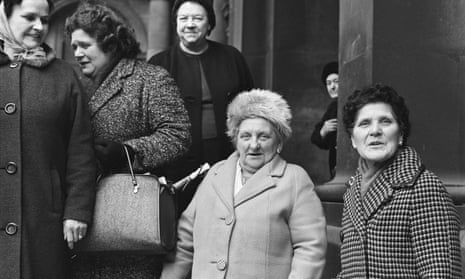Rumours that the Government is planning to sack hundreds of its office cleaners in the name of economy have aroused indignation in the ranks of Whitehall’s early-morning army. The Civil Service Union still hopes to get the Treasury to change its mind.
Outside the Foreign Office one cold morning last week, the cleaners, wonderful women with bags, fur coats, paste brooches, warm boots and silk headscarves, some smoking cigarettes, spoke their minds.
“It’s terrible. It’s all wrong. All the bombing and the blackout we came through when the money was hardly nothing. And now we’re widows they’re chucking us out. Being alone leads to deterioration and losing interest: you’re going to miss all your friends you’ve known all your life.”
“I’ve done 28 years here.” “I’ve done 32. All weathers.” “We’re getting old.” “And good-looking and not afraid of a bit of work.” “After this, we’ll all have to go up the Dilly [Piccadilly] to get a living.” Cackles of laughter. “It’s supposed to be the old ones to go, isn’t it? The worst of it is we don’t know how true it is.”
Ring for housekeeper
“It’s the most disgusting thing I’ve ever heard of. We’ve been here all the war and cleared up all the broken glass, soot, everything: never had the men to do it. And we got five bob for stopping till 12 o’clock to do it: to clear up all this rubbish after old Hitler.”
“It’s a strict building, the Foreign Office. If they pick up a book with dust on it, they’ll soon complain. They’ll ring up the housekeeper – he’s a man. I’ve had that happen to me. I’ve done the same offices for 26 years, and I love them like I do my flat, my own little rabbit hutch.
“I can’t see the contract doing it: there’ll soon be complaints, and they’ll ring up for the housekeeper. We came here with the bricks, and, when we get out, the building will collapse. Tell ‘em how the old ones did the dirty work. We’ve been at it so long it’s like your dinner.”
“When I started here it was only a widow’s job: you couldn’t get in if you had a husband. Twenty-eight bob it was. We wanted the job because we had kiddies. They tried contract cleaning over the road at Curtis Green, where Scotland Yard was, and they threw them out and had direct cleaning back in again. Now they’re throwing them out again and getting contract in again, just to save two bob.”
“I think it’s disgusting to treat us like it when we’ve done all we can.”
“They talk about helping the old people, and what do they do? When you get old, you’ve given the best years of your life, and you can’t get another job. It’s like taking your roots up, isn’t it?” “Up the workers.”
This article, “It’s the poor what gets the blame” by John Gale, was published on page nine of the Observer on 4 February 1968
